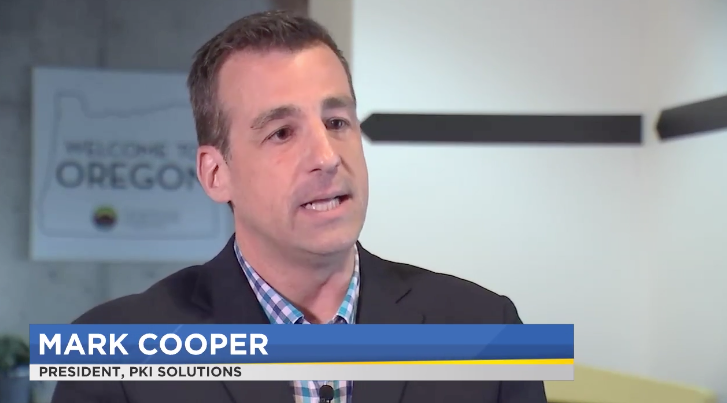Wi-Fi Passwords Hacked at Local Coffee Shop; Cybersecurity Expert Offers Tips

Seventy percent of hacking incidents occur when users connect to unsecured Wi-Fi networks such as restaurants, airports, and coffee shops, according to Norton’s Wi-Fi Risk Report. While a free Wi-Fi connection in a public space seems fine for users on the go, people can make themselves an easy target for hackers and put their information at risk.
Free or public Wi-Fis are hotspots (pun intended) for hackers and data snoopers who want to steal your private data, passwords, or financial information. Such was the case recently in Portland, at Floyd’s Coffee Shop, a staple in Old Town Chinatown, which recently had its Wi-Fi network hacked. Fox 12 Oregon’s KPTV covered this news story and interviewed local cybersecurity expert Mark Cooper, president and founder of PKI Solutions, to offer tips for companies and users. PKI Solutions, a cybersecurity firm based in Portland and supporter of Cyber Oregon, provides public key infrastructure (PKI) consultancy and training.
Floyd’s Coffee Shop learned that the hacker changed passwords, including ones for their surveillance cameras, and gained access to users who were logged onto the shop’s Wi-Fi network at the time. Since this incident, Floyd’s has taken additional security measures to protect the business and the privacy of its customers, according to the news report.
“One of the easiest things that a coffee shop in this case could probably do is to actually have two different Wi-Fi networks,” Cooper said. “And one of those scenarios is what we would call a guest Wi-Fi, and that connection would only have access to the Internet, wouldn’t have the ability to get access to cameras or the point of sales system.”
When you rely too much on the Wi-Fi security at coffee shops, you fall into the traps that hackers have laid out for you. According to PureVPN, here are some of the many things that hackers can learn about you:
- All the historical data from your device
- The name of all the places you last visited
- About your personality or traits through the social apps you use
- The documents you send or upload to the cloud
Cooper recommends these security tips for customers to protect themselves and their data:
- Really think about what you’re doing online in a public setting
- Make sure the website you’re on in a public setting is encrypted. You can tell if it has a lock symbol in the URL.
- Start using a virtual private network (VPN). This will launch an encrypted network that prevents anyone from seeing your activity even while you’re logged in on public Wi-Fi.
- Turn off automatic Wi-Fi connection so that your device doesn’t join any network without your permission.
- Look into two-factor authentication to access your accounts. See Stay Safer Online with Two-Factor Authentication for more information.
As a result of this incident, Floyd’s is taking action. It is separating its Wi-Fi networks now, and established a time limit for how long customers can use it. The shop is also looking into a service that monitors Internet activity.
To watch the Fox 12 Oregon report: https://www.kptv.com/news/wifi-passwords-hacked-at-local-coffee-shop-security-compromised/article_88e645ae-7c49-11e9-9aae-5386cbe68e0b.html
For more information about cybersecurity resources for small businesses, please visit https://cyberoregon.com/small-business/#resources
